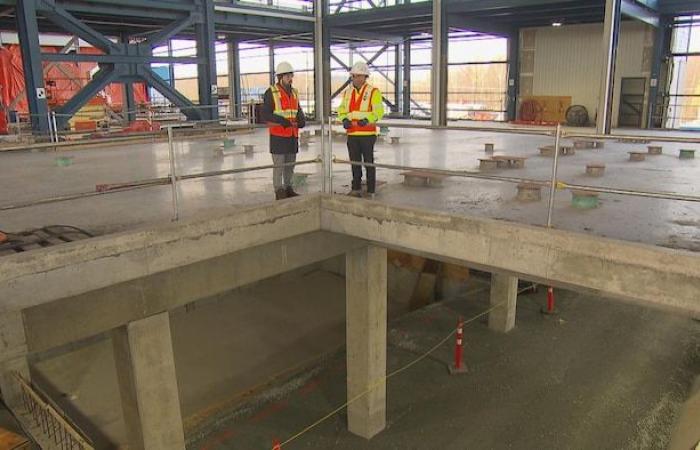Energy Solutions Volta Canada plans to use hexavalent chromium, an element feared for its harmful effects on health, in its copper sheet manufacturing plant in Granby. However, the company assures that state-of-the-art equipment will ensure that there will be no negative impact on the environment.
We want to be an exemplary corporate citizen, it’s really part of our values
exclaims Daniel Guillemette, health, safety and environment manager for Volta Canada Energy Solutions.
He agreed to welcome us to the factory construction site to take stock of one of the most important industrial projects in Granby in recent decades. Construction of the approximately 47,000 square foot factory is 40% complete.
We have even higher requirements than what the standard requires.
The building structure is in place to accommodate equipment that will transform scrap into copper foil using sulfuric acid, water and air.
Open in full screen mode
The tanks that will transform the copper will soon be installed there.
Photo: - / Filming
These sheets will be used for electric car batteries. This is what allows current to pass through the battery.
explains Mr. Guillemette.
A red flag
Hexavalent chromium is used at the plating stage, when copper is formed into sheets, to improve corrosion resistance.
It is not a substance like any other, according to professor of environmental chemistry at the University of Montreal Sébastien Sauvé. This is exactly what caused the scandal in the Erin Brockovich story
he emphasizes.
Erin Brockovich is known for winning a legal battle against a multinational corporation that was polluting California’s drinking water. In 2000, she was portrayed by actress Julia Roberts in a film bearing her name.
A release of chromium into water or air, even though it is known to be carcinogenic, according to Mr. Sauvé, could be worrying. There is a need for vigilance, and it will all be in the details of the monitoring programs.
There is clearly a red flag that goes up when using hexavalent chromium.
Daniel Guillemette wants to be reassuring regarding the management of chrome. Volta plans to transform hexavalent chromium into trivalent chromium at the end of the process, making it non-toxic.
The company is also building its own wastewater treatment plant, which will send water that meets standards into the City of Granby’s sewer network. There will be chromium and copper residue [dans l’eau de procédé]but by going through the treatment plant, we will ensure that our wastewater which will be sent to the city meets the standards, and even beyond
he explains.
A molecule that transforms
Professor Sébastien Sauvé believes that adequate treatment is entirely plausible. They can change hexavalent chromium to trivalent chromium and lower the stakes, that’s true. We just have to make sure that it is done well and that there is an environmental monitoring and compliance program.
he emphasizes.
This program is all the more essential, according to him, as trivalent chromium can be transformed back into hexavalent chromium once in nature, depending on environmental conditions
.
Daniel Guillemette is hopeful that the Volta project will soon receive approval from the Ministry of the Environment for the operation of the plant. The company believes that it is not subject to the environmental impact assessment and review procedure, which could have included an analysis by the Bureau d’audiences publique sur l’environnement (BAPE).
Significant economic impacts
At the office of the mayor of Granby, we see that Volta has already demonstrated its desire to be involved in the community and has adopted good environmental practices.
Julie Bourdon is particularly delighted that the company has agreed to reduce the volume of water that will be used during production. It’s a factory that uses a lot of water, but we came to restrict what they could use, she emphasizes. They had to use new technologies. It risks being one of the most environmental companies [de toutes les usines qui appartiennent à Volta].
This is a very nice project in the battery sector. We are very proud to be able to receive them.
In addition to the transfer taxes which made it possible to increase the City’s surplus in 2023, the company plans to offer more than 200 well-paid jobs. A company like this will pay good municipal taxes
explains Ms. Bourdon.
Regional suppliers were also prioritized, underlines Daniel Guillemette. It’s part of our values.
He also ensures that despite the financial difficulties of Northvolt, which could be an important customer, the project is not compromised. We already have customers here, in Canada, and in the United States. Our desire is to meet their current needs.
A process which also arouses interest
Beyond environmental issues, the Volta plant is also attracting attention for its process considered less traditional by Professor Claude Bazin, of the department of mining, metallurgy and materials engineering at Laval University.
In particular, no merger stage is planned. Usually, you plate the copper, melt it, then mold it into the shape you want. They make a plate directly. I found this a brilliant method.
I find this an ingenious system.
By avoiding the fusion stage, we also reduce certain environmental risks, according to Mr. Bazin. There is no fusion, so there is no risk of releasing arsenic or other things that can be problematic for the environment.
He is not worried about technological risks, since Volta already has several factories elsewhere in the world, including in Hungary. They are taking a technology that already exists, and they are going to adapt it to Quebec.
Volta will, however, have to source uncontaminated copper scrap, which could be a challenge, according to the professor. I think it’s going to be a challenge to have copper residue that is clean, that isn’t too full of junk.
The search for suppliers is also underway, according to Daniel Guillemette. We hope that it will be suppliers here, in Quebec, but otherwise, there are some in Ontario.
Volta plans to begin operations at the end of 2025.






